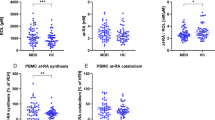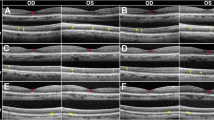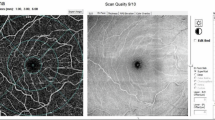Abstract
The hereditary retinal dystrophies (HRDs) are a group of genetically determined disorders that result in loss of the visual function. There is a lack of standard pharmacological treatments or widely accepted nutritional recommendations. The objective of this review is to summarise the scientific evidence on the effectiveness and safety of nutritional supplements for the treatment of HRDs. We conducted a scientific literature search on Medline and PreMedline, EMBASE, SCI-EXPANDED, SSCI, and The Cochrane Library up to August 2014. Experimental, quasi-experimental and controlled observational studies were selected. Eight studies were ultimately included, seven on retinitis pigmentosa (RP) and one on Best disease. Vitamin A, vitamin E, docosahexaenoic acid (DHA), lutein and β-carotene were assessed. A 15 000 IU daily dose of vitamin A was reported to have shown a small protective effect on the progression of RP, as was the use of the carotenoids lutein and β-carotene. Different DHA doses has no effect on RP or Best disease. No supplement showed severe adverse effects in the selected studies although strong evidence of toxicity exists for high doses of vitamin A and β-carotene in certain populations. The selected studies concluded that there may be a small beneficial effect of vitamin A, lutein and β-carotene on the progression of RP. The limited evidence available indicates some well-designed additional studies on combined supplements strategies may achieve more robust conclusions. Moreover, the scarcity of evidence available on the treatment of HRD other than RP with nutritional supplements supports the need for further research efforts.
Similar content being viewed by others
Log in or create a free account to read this content
Gain free access to this article, as well as selected content from this journal and more on nature.com
or
References
Inglehearn C . Molecular genetics of human retinal dystrophies. Eye 1998; 12 (Pt 3b): 571–579.
Givre S, Gard S . Retinitis pigmentosa: clinical presentation and diagnosis. UpToDate (2014). Available at: http://www.uptodate.com/contents/retinitis-pigmentosa-clinical-presentation-and-diagnosis (accessed 19 June 2015).
Hodge WG, Barnes D, Schachter HM, Pan YI, Lowcock EC, Zhang L et al. The evidence for efficacy of omega-3 fatty acids in preventing or slowing the progression of retinitis pigmentosa: a systematic review. Can J Ophthalmol 2006; 41 (4): 481–490.
Rayapudi S, Schwartz S, Wang X, Chavis P Vitamin A and fish oils for retinitis pigmentosa. Cochrane Database Syst Rev 2013; (12): CD008428.
Sacchetti M, Mantelli F, Merlo D, Lambiase A . Systematic review of randomized clinical trials on safety and efficacy of pharmacological and nonpharmacological treatments for retinitis pigmentosa. J Ophthalmol 2015; 2015: 737053.
Weleber R, Kurz D, Trzupek K . Treatment of retinal and choroidal degenerations and dystrophies: current status and prospects for gene-based therapy. Ophthalmol Clin North Am 2003; 16 (4): 583–593.
Scottish Intercollegiate Guidelines Network (SIGN). SIGN 50: A guideline Developer’s Handbook. SIGN: Edinburgh, 2014.
Liberati A, Altman DG, Tetzlaff J, Mulrow C, Gøtzsche PC, Ioannidis JPA et al. The PRISMA statement for reporting systematic reviews and meta-analyses of studies that evaluate healthcare interventions: explanation and elaboration. BMJ 2009; 339: b2700.
Hoffman DR, Hughbanks-Wheaton DK, Pearson NS, Fish GE, Spencer R, Takacs A et al. Four-year placebo-controlled trial of docosahexaenoic acid in X-linked retinitis pigmentosa (DHAX trial): a randomized clinical trial. JAMA Ophthalmol 2014; 132 (7): 866–873.
Hoffman DR, Hughbanks-Wheaton DK, Spencer R, Fish GE, Pearson NS, Wang YZ et al. Docosahexaenoic acid slows visual field progression in X-linked retinitis pigmentosa: ancillary outcomes of the DHAX trial. Invest Ophthalmol Vis Sci 2015; 56 (11): 6646–6653.
Bahrami H, Melia M, Dagnelie G . Lutein supplementation in retinitis pigmentosa: PC-based vision assessment in a randomized double-masked placebo-controlled. BCM Ophthalmol 2006; 6: 23.
Berson EL, Rosner B, Sandberg MA, Hayes KC, Nicholson BW, Weigel-DiFranco C et al. A randomized trial of vitamin A and vitamin E supplementation for retinitis pigmentosa. Arch Ophthalmol 1993; 111 (6): 761–772.
Berson EL, Rosner B, Sandberg MA, Weigel-DiFranco C, Brockhurst RJ, Hayes KC et al. Clinical trial of lutein in patients with retinitis pigmentosa receiving vitamin A. Arch Ophthalmol 2010; 128 (4): 403–411.
Berson EL, Rosner B, Sandberg MA, Weigel-difranco C, Moser A . Clinical trial of docosahexaenoic acid in patients with retinitis pigmentosa receiving vitamin A treatment. Arch Ophthalmol 2004; 122 (9): 1306–1314.
Berson EL, Rosner B, Sandberg MA, Weigel-difranco C, Moser A . Further evaluation of docosahexaenoic acid in patients with retinitis pigmentosa receiving vitamin A treatment: subgroup analyses. Arch Ophthalmol 2004; 122 (9): 1306–1314.
Hoffman DR, Locke KG, Wheaton DH, Fish GE, Spencer R, Birch DG . A randomized, placebo-controlled clinical trial of docosahexaenoic acid supplementation for X-linked retinitis pigmentosa. Am J Ophthalmol 2004; 137 (4): 704–718.
Hughbanks-Wheaton DK, Birch DG, Fish GE, Spencer R, Pearson NS, Takacs A et al. Safety assessment of docosahexaenoic acid in X-linked retinitis pigmentosa: the 4-year DHAX trial. Invest Ophthalmol Vis Sci 2014; 55 (8): 4958–4966.
Lee TKM, Clandinin MT, Hébert M, MacDonald IM . Effect of docosahexaenoic acid supplementation on the macular function of patients with Best vitelliform macular dystrophy: randomized clinical trial. Can J Ophthalmol 2010; 45 (5): 514–519.
Rotenstreich Y, Belkin M, Sadetzki S, Chetrit A, Ferman-Attar G, Sher I et al. Treatment with 9-cis β-carotene-rich powder in patients with retinitis pigmentosa: a randomized crossover trial. JAMA Ophthalmol 2013; 131 (8): 985–992.
Sibulesky L, Pronczuk A, Weigel-difranco C, Rosner B, Berson EL . Safety of <7500 RE (<25000 IU) vitamin A daily in adults with retinitis pigmentosa. Am J Clin Nutr 1999; 69 (4): 656–663.
Wheaton DH, Hoffman DR, Locke KG, Watkins RB, Birch DG . Biological safety assessment of docosahexaenoic acid supplementation in a randomized clinical trial for X-linked retinitis pigmentosa. Arch Ophthalmol 2003; 121 (9): 1269–1278.
Chowers I, Banin E, Merin S, Cooper M, Granot E . Long-term assessment of combined vitamin A and E treatment for the prevention of retinal degeneration in abetalipoproteinaemia and hypobetalipo-proteinaemia patients. Eye 2001; 15 (Pt 4): 525–530.
Aleman TS, Cideciyan AV, Windsor EA, Schwartz SB, Swider M, Chico JD et al. Macular pigment and lutein supplementation in ABCA4-associated retinal degenerations. Invest Ophthalmol Vis Sci 2007; 48 (3): 1319–1329.
Sipilä I, Rapola J, Simell O . Supplementary creatine as a treatment for gyrate atrophy of the choroid and retina. N Engl J Med 1981; 304 (15): 867–870.
Peltola K, Heinonen OJ, Näntö-Salonen K, Pulkki K, Simell O . Oral lysine feeding in gyrate atrophy with hyperornithinaemia - a pilot study. J Inherit Metab Dis 2000; 23 (4): 305–307.
Rotenstreich Y, Harats D, Shaish A, Pras E, Belkin M . Treatment of a retinal dystrophy, fundus albipunctatus, with oral 9-cis-{beta}-carotene. Br J Ophthalmol. 2010; 94 (5): 616–621.
Salem NJ, Litman B, Kim H, Gawrisch K . Mechanisms of action of docosahexaenoic acid in the nervous system. Lipid 2001; 36 (9): 945–959.
Giusto NM, Pasquaré SJ, Salvador GA, Castagnet PI, Roque ME, Ilincheta de Boschero MG . Lipid metabolism in vertebrate retinal rod outer segments. Prog Lipid Res 2000; 39 (4):315–391.
Schalch W . Carotenoids in the retina—a review of their possible role in preventing or limiting damage caused by light and oxygen. EXS 1992; 62: 280–298.
Massof RW, Finkelstein D . Supplemental vitamin A retards loss of ERG amplitude in retinitis pigmentosa. Arch Ophthalmol 1993; 111 (6): 751–754.
Massof RW, Fishman GA . How strong is the evidence that nutritional supplements slow the progression of retinitis pigmentosa? Arch Ophthalmol 2010; 128 (4): 493–495.
Dagnelie G, Melia B, Sunness J . Lutein supplementation in RP: Vision measures in the clinic. Invest Ophthalmol Vis Sci 2003; 44: 780.
Druesne-Pecollo N, Latino-Martel P, Norat T, Barrandon E, Bertrais S, Galan P et al. Beta-carotene supplementation and cancer risk: a systematic review and metaanalysis of randomized controlled trials. Int J Cancer 2010; 127: 172–184.
Chen J, Wall M . Epidemiology and risk factors for idiopathic intracranial hypertension. Int Ophthalmol Clin 2014; 54 (1): 1–11.
Warner JE, Larson AJ, Bhosale P, Digre KB, Henley C, Alder SC et al. Retinol-binding protein and retinol analysis in cerebrospinal fluid and serum of patients with and without idiopathic intracranial hypertension. J Neuroophthalmol 2007; 27 (4): 258–262.
Geubel A, De Galocsy C, Alves N, Rahier J, Dive C . Liver damage caused by therapeutic vitamin A administration: estimate of dose-related toxicity in 41 cases. Gastroenterology 1991; 100 (6): 1701–1709.
Radu RA, Yuan Q, Hu J, Peng JH, Lloyd M, Nusinowitz S et al. Accelerated accumulation of lipofuscin pigments in the RPE of a mouse model for ABCA4-mediated retinal dystrophies following Vitamin A supplementation. Invest Ophthalmol Vis Sci 2008; 49 (9): 3821–3829.
Acknowledgements
This work was supported by the Institute of Health Carlos III, an autonomous organisation of the Spanish Ministry of Economy and Finance, in cooperation with the Evaluation Service of the Canary Islands Health Service (SESCS), in the framework of the activities developed by the Spanish Network of Agencies for Health Technology Assessment for the National Health Service financed by the Spanish Ministry of Health, Social Services and Equality. We thank the information specialist Mrs Leticia Cuellar Pompa for the development of the search strategies for electronic literature databases. We also thank Ms Rowan Maxwell for her assistance in improving the English language of the present manuscript.
Search terms and databases
Electronic searches were performed on Medline and PreMedline, EMBASE, SCI-EXPANDED, SSCI, and The Cochrane Library. The search strategy was developed initially in MEDLINE using controlled vocabulary and free text terms and then it was adapted for each of the other databases. Searches were limited to the English and Spanish languages and no date restriction was imposed. The Medline search strategy is presented in Table 1 and the full search strategy is available from the study authors.
Author information
Authors and Affiliations
Corresponding author
Ethics declarations
Competing interests
The authors declare no conflict of interest.
Rights and permissions
About this article
Cite this article
Brito-García, N., del Pino-Sedeño, T., Trujillo-Martín, M. et al. Effectiveness and safety of nutritional supplements in the treatment of hereditary retinal dystrophies: a systematic review. Eye 31, 273–285 (2017). https://doi.org/10.1038/eye.2016.286
Received:
Accepted:
Published:
Issue date:
DOI: https://doi.org/10.1038/eye.2016.286
This article is cited by
-
A novel small molecule chaperone of rod opsin and its potential therapy for retinal degeneration
Nature Communications (2018)



